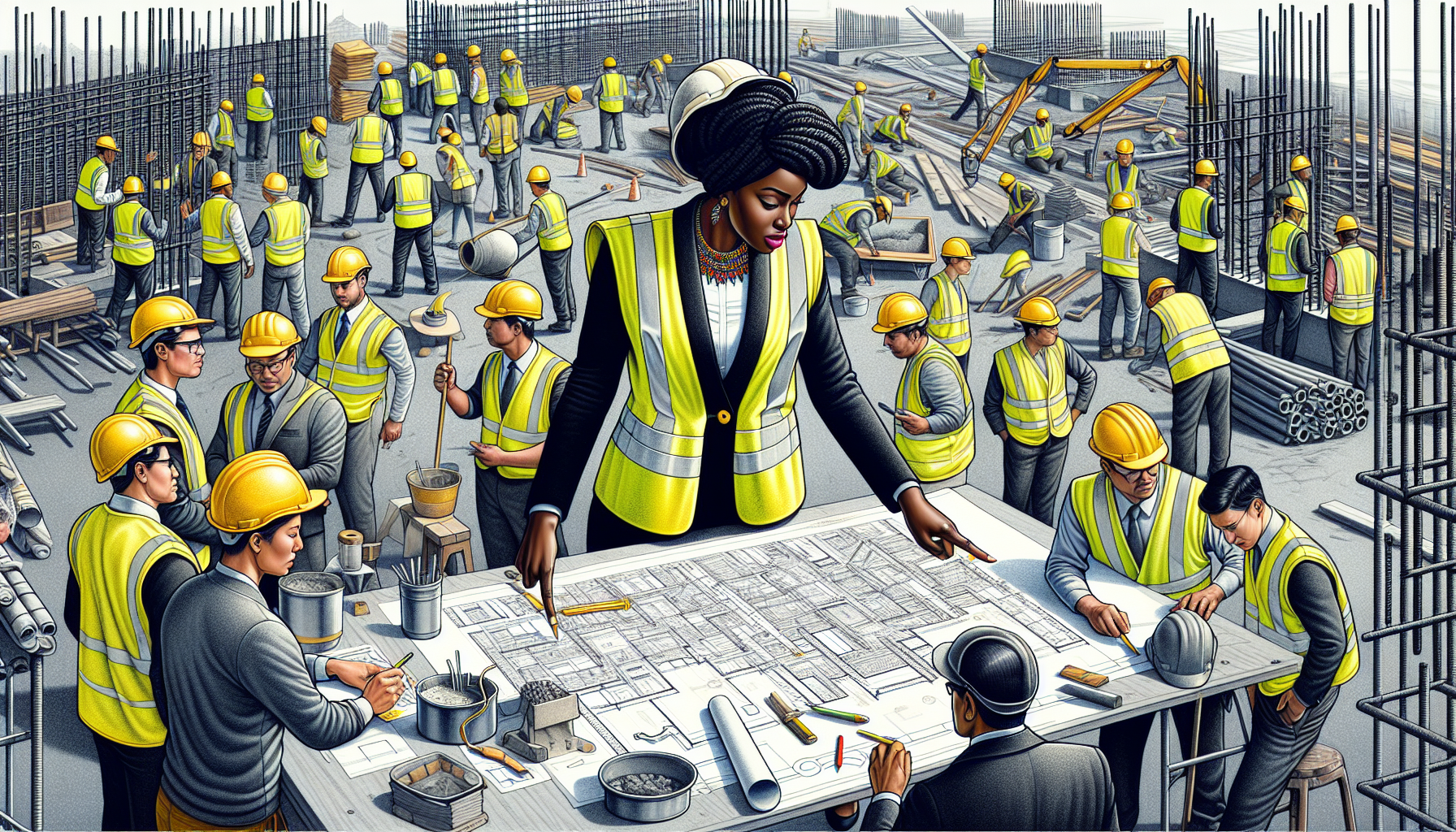In the realm of construction, general contracting is your guide and overseer, the key to coordinating tasks, managing budgets, and ensuring quality. When embarking on a construction project, choosing the right general contractor can make the difference. This article dives into their roles, responsibilities, and strategic importance to your project, equipping you with the must-know details for successful collaboration without overwhelming you with industry jargon or details better suited for the hands-on professional.
Key Takeaways
- General contractors are essential for the complete coordination of construction projects, including task planning, quality control, and ensuring compliance with codes and environmental guidelines.
- Licensing is crucial for general contractors to confirm their adherence to regulations, and insurance provides necessary protection against potential risks associated with construction projects.
- The bidding process and contract negotiations are key elements of a general contractor’s responsibilities, requiring expertise and precision to ensure projects are completed on time, within budget, and to the client’s satisfaction.
The Role of a General Contractor

As the conductor of the construction orchestra, the general contractor co-ordinates all aspects of a construction project, ensuring that each phase aligns with the project plan. The general contractor’s role includes:
- Selecting and overseeing subcontractors
- Ensuring their work meets project standards
- Upholding quality control
- Ensuring compliance with environmental guidelines
The general contractor, often acting as a construction manager or a construction superintendent, plays a multi-faceted and essential role in the success of the building project, encompassing a wide range of general contractor’s responsibilities.
In the early stages of the project, general contractors are responsible for:
- Critical task planning
- Initial site setup activities
- Managing personnel
- Adhering to local codes and regulations
- Maintaining a steady supply of materials
- Managing various tasks through different stages of the construction process.
Construction Project Management
At the heart of a general contractor’s role lies construction project management. Understanding the project scope, deliverables, and established deadlines is vital before finalizing any contract agreement. This is where a project manager and technology come in handy. Construction project management software, such as ProjectManager, is recommended for general contractors to keep track of project timelines, budgets, and resources.
Using such software, general contractors can effectively manage every aspect of the project, including:
- Planning and scheduling
- Budgeting and cost management
- Resource allocation
- Document management
- Communication and collaboration
- Quality control and inspections
This ensures that the construction process runs smoothly, with every task completed on time and within the budget.
Communication and Problem Solving
Effective communication is the glue that holds a construction project together. This is especially true in commercial projects, where larger and more diverse teams require collaboration for successful project completion. From coordinating with the design team to interfacing with the project owner, the general contractor must be a master communicator.
Another crucial skill in a general contractor’s arsenal is problem-solving. Challenges are par for the course in construction projects, and general contractors need to swiftly address these to ensure operations run smoothly without interruptions. This is where the passion and dedication of a general contractor come into play, making adjustments as necessary to overcome obstacles and meet project goals.
Types of General Contractors

While the general contractor’s role remains consistent across projects, the specific tasks they undertake can vary depending on the type of project. This leads us to the two main types of general contractors: commercial and residential. Each type focuses on different types of construction projects, and their roles and responsibilities reflect these differences.
Commercial general contractors typically oversee larger projects like office buildings and retail centers, necessitating extensive planning and coordination. On the other hand, residential general contractors focus on constructing or renovating individual homes and smaller housing developments. This distinction is important, as it dictates the kind of work general contractors do, the building materials they use, and the code and compliance requirements they must adhere to.
Commercial General Contractor
Commercial general contractors are the heavyweights of the construction industry. They specialize in overseeing all stages of commercial construction, from design to adhering to building codes and zoning regulations. These projects range from commercial to retail, and even public or government sector constructions. As one of the top construction companies, they have a significant impact on the industry.
Commercial general contractors may focus on specific types of buildings, including:
- Grocery stores
- Carwashes
- Restaurants
- Shopping centers
With expertise in managing large-scale projects, the scale and complexity of these projects demand a high level of expertise and coordination, making commercial general contractors a pivotal part of any commercial construction project.
Residential General Contractor

On the other side of the spectrum, we have residential general contractors. Their realm of expertise lies in constructing and renovating individual homes and smaller housing developments. As experienced contractors, they play a crucial role in the development of single-family homes, creating tailored and comfortable living spaces for families or individual homeowners.
The work of a residential general contractor often includes:
- Engaging directly with families or individual homeowners
- Translating their dreams and ideas into a tangible, comfortable living space
- Having a deep understanding of residential construction
- Having a keen eye for detail
- Having a passion for creating beautiful homes.
Licensing and Certifications
Like many professions, general contractors are also subject to licensing and certifications. These are crucial to ensure compliance with state regulations, insurance requirements, and safety standards. Each state has distinct mandatory licenses for general contractors, and requirements may vary depending on jurisdiction.
Being licensed not only regulates contractors and confirms compliance with guidelines for insurance, taxes, and safety, but it also provides:
- Protection against lawsuits
- Proper channels for permits and regulations
- Ensures the contractor has established credibility and trustworthiness
- Allows contractors to protect their lien rights in many states.
State Licensing Requirements
The licensing requirements for general contractors can vary widely from state to state. For instance, in Massachusetts, general contractors working on structures smaller than 35,000 cubic feet are required to have a state-issued license. Additionally, they must register as a Home Improvement Contractor for certain residential projects.
The licensing process often involves verifying work experience, submitting the candidate exam registration form, and passing a licensing exam. The license needs to be renewed periodically, which requires general contractors to complete continuing education courses and pay a license fee. Interestingly, Massachusetts does not recognize out-of-state contractor licenses, necessitating obtaining a Massachusetts-issued Construction Supervisor License for conducting construction work within the state.
Importance of Insurance and Liability Coverage
Insurance and liability coverage play a vital role in the construction industry. These safeguards protect both general contractors and clients from potential risks and financial losses. For example, Massachusetts mandates workers’ compensation insurance for all employers, including general contractors, to cover employee injuries on the job.
Beyond workers’ compensation, general contractors also need to consider liability insurance. This type of insurance provides coverage for potential property damage or injuries that could occur during the construction process. With the right insurance and liability coverage, both the general contractors and their clients can have peace of mind knowing that they’re protected against potential risks.
The Bidding Process and Contract Negotiation

The bidding process and contract negotiation are fundamental aspects of a general contractor’s work. It all starts with the availability of bid documents, which kicks off the process of preparing and submitting a proposal for the project. General contractors commonly use the Lump Sum or Stipulated Sum contract approach for bidding.
In the ‘hard bid’ method, general contractors calculate the costs of materials, personnel, company overhead, and the project’s inherent risks. Commercial general contractors experience complex contract negotiations due to factors such as multiple stakeholders, stricter regulations, and the varied needs of businesses. These processes demand expertise, precision, and a keen understanding of the construction industry.
Steps in the Bidding Process
The bidding process for general contractors consists of several important steps. These steps include:
- Bid solicitation
- Submission
- Selection
- Contract formation
- Project delivery
General contractors start by examining invitations to bid, project drawings, and specifications to create accurate project estimates with the aid of contractor estimate templates, keeping the construction budget in mind.
Once they have prepared the necessary documentation, general contractors assemble their final bid, which includes the filled bid form and any additional information requested, and submit it to the project owner. This process requires careful planning, rigorous attention to detail, and a thorough understanding of the project requirements.
Contract Negotiation Strategies
Contract negotiation is a fine art that involves balancing the interests of both the general contractor and the client. Including provisions concerning project budget, timelines, and payment terms in the contract is essential to prevent future disputes. A dispute resolution clause should also be incorporated into the contract, designating how to handle issues such as construction delays through arbitration or litigation.
However, not all negotiations end in a contract. General contractors should be prepared to end negotiations and walk away from a project if the terms are not advantageous or if the project involves excessive risks. Effective contract negotiation strategies are crucial in safeguarding the interests of both the general contractor and the client. Here are some strategies to consider:
- Clearly define the scope of work and project requirements
- Establish a timeline and milestones
- Determine payment terms and schedule
- Include provisions for change orders and dispute resolution
- Consider insurance and liability coverage
- Review and negotiate contract terms and conditions
By following these strategies, you can aim for an agreement that offers clear terms and minimizes potential conflicts.
Managing Subcontractors and Suppliers

In addition to overseeing the overall project, general contractors also manage subcontractors and suppliers. They perform the following tasks:
- Select subcontractors through a bidding process
- Manage subcontractors by overseeing their payroll and payments
- Ensure safety measures to mitigate accidents and related costs.
This role extends to suppliers as well. General contractors are responsible for:
- ensuring that the necessary funds are available
- procuring materials and tools
- ensuring that materials and tools are present on-site for the construction project
Thus, maintaining strong working relationships with subcontractors and suppliers is crucial for the successful completion of a project.
Selecting and Hiring Subcontractors
The process of selecting and hiring subcontractors involves several steps. Here is an overview of the process:
- General contractors distribute bid invitations to subcontractors, specifying the project details and work scope.
- Subcontractors submit their proposals on bid day.
- Subcontractors are selected based on the scope of work, their previous project successes, portfolio, references, and special requirements of the work.
However, selecting the right subcontractor is not just about the lowest bid. General contractors must also consider the subcontractor’s reputation, ability to complete specific project components within established timelines, and their compatibility with the project goals. This requires a careful evaluation and selection process, ensuring that the subcontractor is not only competent but also a good fit for the project.
Coordinating with Suppliers
Coordinating with suppliers is another crucial aspect of a general contractor’s role. To manage the supply chain effectively, general contractors need to:
- Ensure the timely and well-coordinated movement of personnel, materials, and equipment
- Schedule deliveries
- Maintain inventory
- Ensure that the necessary materials are available when needed.
Building relationships with suppliers can also be beneficial. Personal outreach, such as hosting free lunches or visiting job sites, can strengthen the cooperation between general contractors and suppliers. This not only facilitates smooth operations but also contributes to the overall success of the construction project.
On-Site Supervision and Quality Control
On-site supervision and quality control are two critical aspects of a general contractor’s role. Professionalism in general contractors is essential for successful on-site supervision, characterized by clear communication, effective management of employees, and proper handling of clients. They oversee the hiring and management of subcontractors while ensuring that the construction project remains within budget and on schedule, reflecting the importance of their supervisory role.
Maintaining high-quality standards on construction projects involves systematic inspections and testing of construction materials and workmanship by general contractors. This ensures that the completed project not only meets but exceeds the expectations of the client.
Site Safety and Compliance
Safety is always a top priority in any construction project. Licensed general contractors must comply with building codes and safety standards to ensure safety and adherence to legal requirements. Through risk management practices, general contractors identify and mitigate potential safety issues on construction sites.
Safety measures implemented on construction sites protect not only onsite workers but also the surrounding public from hazards such as falling objects. Moreover, commercial and residential projects have notable differences in regulatory compliance, with commercial projects typically subject to more stringent accessibility and zoning laws.
Inspections and Quality Assurance
Regular inspections and quality assurance practices are crucial tools for maintaining high-quality standards throughout a construction project. A detailed inspection plan and checklist are integral components of a general contractor’s quality assurance plan, ensuring that all construction work adheres to the set standards.
General contractors perform regular audits and inspections throughout the construction project lifecycle to verify continuous adherence to quality standards. Upon identifying problems during inspections, general contractors undertake a thorough review and analysis to prevent similar issues in the future, contributing to the continuous elevation of quality control standards.
Summary
From overseeing the planning to ensuring the successful completion of the project, the role of a general contractor is multifaceted and crucial. They are the central player in any construction project, managing subcontractors, coordinating with suppliers, ensuring site safety, and maintaining quality control. As we’ve seen, being a successful general contractor requires not only technical skills but also strong management abilities, effective communication, problem-solving skills, and a keen understanding of the construction industry. In the world of construction, the general contractor is indeed the conductor of the orchestra, ensuring that every piece falls perfectly into place.
Frequently Asked Questions
What is the role of the general contractor?
A general contractor is responsible for overseeing a construction project from start to finish, acting as a liaison between the property owner, suppliers, vendors, and tradespeople. Their role is crucial in bringing a building to life.
What is the meaning of general contract?
General contracts are legal documents that outline the terms and conditions of an agreement and should be understood by small business owners, as they are likely to encounter them in the course of business. Understanding contract law is essential for navigating these agreements successfully.
What are the two main types of general contractors?
There are two main types of general contractors: commercial and residential. Commercial contractors handle large-scale projects like office buildings, while residential contractors focus on individual homes and smaller housing developments.
Why are licensing and certifications important for general contractors?
Licensing and certifications are important for general contractors because they ensure compliance with state regulations, insurance requirements, and safety standards, while also providing protection against lawsuits and establishing credibility and trustworthiness. So, it’s crucial for contractors to obtain the necessary licenses and certifications.
What is the bidding process in construction?
The bidding process in construction involves bid solicitation, submission, selection, contract formation, and project delivery. General contractors prepare detailed proposals including cost breakdowns and timelines to compete for the project. It’s a structured process that ensures fair competition and quality selection.


